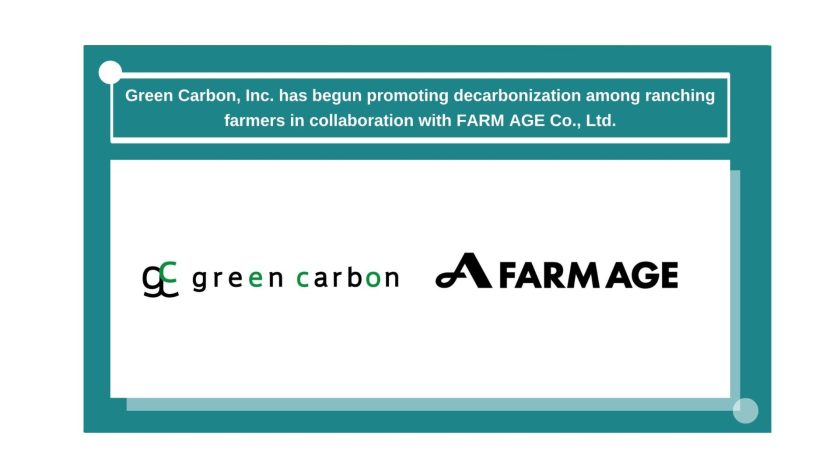The goal is to promote the initiative to approximately 300,000 head of livestock on small- and medium-sized farms, primarily in Hokkaido, and establish a decarbonization model for grazing.
Green Carbon Inc. (CEO: Jun Okita, hereinafter “Green Carbon”), a company developing and selling nature-based carbon credits, announces its collaboration with FARMAGE Co., Ltd. (Representative Director: Eiji Kotani, hereinafter “Farmage”), a consulting firm that supports farmers practicing pasture-based dairy farming. Together, the two companies will jointly promote initiatives for decarbonization and credit generation in pasture-based dairy farming.
〇For inquiries regarding this press release and for further details, please contact:
〇To download Green Carbon Co., Ltd.’s company profile, please visit:
◆Background of Pasture-Based Dairy Farming
In Japan’s dairy industry, rising costs and an aging farming population have led to a continuing decline in the number of dairy farmers and livestock. As of February 1, 2025, the number of dairy cattle stands at approximately 1.293 million. Amid these challenges, there has been a renewed interest in pasture-based dairy farming from the perspectives of environmental sustainability and animal welfare. According to the Ministry of Agriculture, Forestry and Fisheries, about 17% of dairy cattle and 14% of beef cattle (for breeding) are currently raised through grazing.
<Benefits of Pasture-Based Dairy Farming>
| Environmental benefits | ・Grasses absorb carbon dioxide and store carbon in the soil, contributing to carbon sequestration. ・Reduced use of fuel for tractors and other machinery lowers CO₂ emissions. |
| Economic benefits | ・Less dependence on imported feed makes farmers less vulnerable to international price fluctuations. ・The ability to operate with self-supplied feed (pasture grass) makes the system suitable for small-scale farms. |
| Social significance | ・Enables “animal welfare”-oriented management, allowing cows to live in a more natural environment. ・Maximizes the use of wide open land, making it particularly valuable for revitalizing depopulated rural areas. |
◆Background of this project
Amid these various advantages, Green Carbon is promoting environmentally conscious dairy farming under its agricultural carbon credit methodology “AG-002”, which targets agricultural activities including grazing. This methodology accelerates the fermentation process of livestock manure from chickens, pigs, and cattle by introducing forced fermentation systems, thereby reducing emissions of methane (CH₄) and nitrous oxide (N₂O). The reduced emissions are then certified as J-Credits.
Currently, about 60% of farmers manage pile fermentation, which takes around six months to complete and requires significant labor. By introducing forced fermentation systems, dairy farmers can cut their workload by roughly half.
However, due to the high cost of installing such systems, very few dairy farmers have adopted this methodology. To address this challenge, Green Carbon is developing investment-based dairy projects that cover expenses such as the installation of forced fermentation systems, as well as the registration, application, and certification costs for J-Credits.
Through this framework, Green Carbon aims to convert greenhouse gas reductions and removals achieved through grazing into carbon credits, thereby creating new revenue opportunities for farmers while supporting decarbonized farm management. This initiative has led to a partnership with Farmage one of the few consulting firms in Japan that specializes in supporting pasture-based dairy farmers.

○Concept Image of the AG-002 Methodology
◆Future Outlook
Green Carbon will promote and expand the adoption of pasture-based dairy farming particularly among small- and medium-scale dairy farmers in Hokkaido through this collaboration. In addition to cost reductions and improvements in raw milk quality achieved through grazing, Green Carbon aims to establish a sustainable dairy model by visualizing and quantifying the environmental value created, such as reductions in greenhouse gas emissions and increases in soil carbon storage.
Furthermore, Green Carbon plans to conduct demonstration experiments, including the application of biochar to grasslands, to scientifically verify its effects on carbon sequestration and soil improvement. Through these efforts, the company seeks to quantify the environmental contributions of pasture-based dairy farming and build a threefold model that integrates credit generation, productivity enhancement, and environmental conservation.
Beyond the creation of carbon credits, Green Carbon is committed to developing a sustainable agricultural and dairy farming model that balances decarbonization with economic viability.
Looking ahead, Green Carbon will strengthen collaboration among farmers, local governments, distributors, and corporations to foster region-wide partnerships and advance the formation of environmentally conscious local economies. Through these initiatives, Green Carbon aims to disseminate and scale a decarbonized agricultural model that can serve as a benchmark both in Japan and internationally.
◆ Green Carbon Inc.
Representative: Jun Okita, CEO
Head Office: PREX North 9F, 2-3-2 Kojimachi, Chiyoda-ku, Tokyo, Japan
Established: December 2019
Business Activities: Development and sales of carbon credits, agriculture-related projects, environmental projects, other related businesses, and ESG consulting
Website: https://green-carbon.co.jp/en/
◆FARMAGE Co., Ltd.
Representative: Eiji Kotani
Head Office: 166-8 Kanazawa, Tobetsu-cho, Ishikari-gun, Hokkaido, Japan
Established: March 1985
Business Activities: Support for the introduction of grazing systems, design, sales, and installation of electric fences, as well as education and consulting related to pasture-based farming
Website: https://farmage.co.jp/
◆ About Green Carbon
Guided by the vision of “Harnessing the power of life to save the Earth,” Green Carbon develops and supports projects that generate, register, and sell nature-based carbon credits both in Japan and abroad. The company is also engaged in agriculture-related businesses, R&D initiatives, and ESG consulting.
Its business activities span Japan, Southeast Asia, Australia, and South America, creating credits from rice paddies, biochar, forest conservation, carbon farming, mangrove planting, and cattle methane reduction. In Japan, Green Carbon obtained certification in FY2023 for the country’s first and one of the largest-scale rice paddy J-Credit projects (approx. 6,220 t). In FY2024, the company plans to expand this initiative to around 40,000 ha (approx. 80,000 t).
Green Carbon also provides “Agreen,” a one-stop platform service that streamlines the entire process of credit registration, application, and sales. By simplifying procedures and documentation, the service reduces the administrative burden on credit creators.

